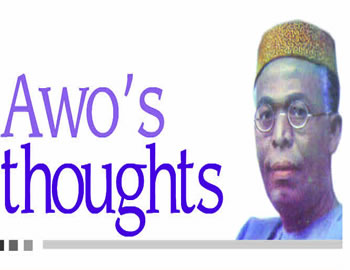
(27) Passports and visas.
(28) Posts, telegraphs and telephones, including post office savings banks.
(29) Prisons and other institutions for the treatment of offenders.
(30) Public Debt of the Federation.
(31) Railways, including ancill.iry transport and other services.
(32) Any matter that is incidental, supplementary, or ancillary to any of the 31 subjects hereinabove mentioned. It is my considered opinion that all matters at present included in the exclusive legislative and concurrent lists, other than those enumerated above, can be decentralized without any risk whatsoever to our unity and territorial integrity. The test of the maturity of the leaders in a Federation is the extent to which they can successfully perform, in common and as a united team, functions which are not within the exclusive legislative or executive competence of the Federal Government.
Professor K. C. Where, in his famous and authoritative book entitled Federal Government, expresses the following opinion:
‘Indeed it is usually a matter of surprise that union is possible at all among communities which differ in language, race, religion or nationality.’ These are words of wisdom which must be constantly borne in mind by those who essay to administer the affairs of a plural society like ours. The centrifugal forces at work in this kind of society may at times be very active, and at other times quiescent. But they are there all the time. From historical and contemporary records, it is the inherent nature of these forces strongly to incline the communities concerned to want to have separate political existence from one another. The Nigerian Federation, therefore, will succeed and survive not by the wishful and thoroughly unscientific thinking of some Nigerians, but only to the extent to which we are able, through rationally thought-out constitutional arrangements, to contain the centrifugal forces at work and subordinate them permanently to the cohesive and centripetal influences of politico-economic union and togetherness.
One well-known argument must be stated and answered at this stage. It has been strenuously urged that, in order to make the Federal Government strong, many of the functions which are now reserved to the States as well as most of those that are now contained in the concurrent list should be vested exclusively in the Federal Government. I beg, very strongly, to differ. It is my considered judgment that any Federal Government which is vested exclusively with the functions which I have enumerated above should be as strong as can be; provided it has the right type of leadership. In other words, what makes a Government strong is not necessarily the multitude of functions vested in it, but the strength of that Government’s leadership. A Government may have all the powers on earth vested in it; but if its leadership is weak, it will be just as ineffective as if it had had no power at all vested in it. On the other hand, the possession of exclusive jurisdiction over Defence, External Affairs in their widest connotation, Monetary Controls, Transport, Post and Telecommunications, not to mention the other functions, is enough to make a Federal Government truly formidable; provided its leadership is honest, strong, disciplined, possesses intellectual comprehension, and properly orientated ideologically.
The division of function between the Federal Government on the one hand, and the States, on the other, is a matter for the Constituent Assembly to decide in the first instance, and for the people voting in a referendum subsequently. But ifit is our strong and genuine desire to have a Constitution which will endure, and which will inspire confidence in, and promote harmonious relations among the various national groups in the country, the crucial test of what and what should go on the exclusive legislative list must be whether or not such a matter can or cannot be decentralized without endangering the unity and territorial integrity of the Federation.
- Compulsory Military Training
The organisation of compulsory part-time military training and refresher course for Nigerians is a job for military experts. If we are in doubt as to how to go about this business, we can learn very quickly from the experiences of other countries where such policy as is here advocated has been in vogue for many years. Two of such countries are USSR and Israel. ‘
I would like to stress three advantages which are sure to accrue from the adoption of this policy. Firstly, we would not need to keep and maintain a large standing army. When all or most of the able- bodied Nigerians – male and female-are trained militarily, our needs for defence, and for the suppression of any large-scale internal disturbance of a violent nature, can be effectively met by appropriate ad hoc mobilization. Secondly, as a result of not keeping a large standing army, we would be able to divert, to economic and social development, funds which otherwise would not have been available for this constructive and beneficial purpose. Thirdly, one of the major causes of inter-ethnic suspicions in Nigeria would be totally removed.
For, when all able-bodied Nigerians have been given military training, no group or groups would be prone to accuse or suspect the other group or groups of actually using or wanting to use their predominance in the army to dominate the country. Nor would any group or groups have the incentive or audacity to make any open, misguided, and inflammatory pretensions to this effect.





